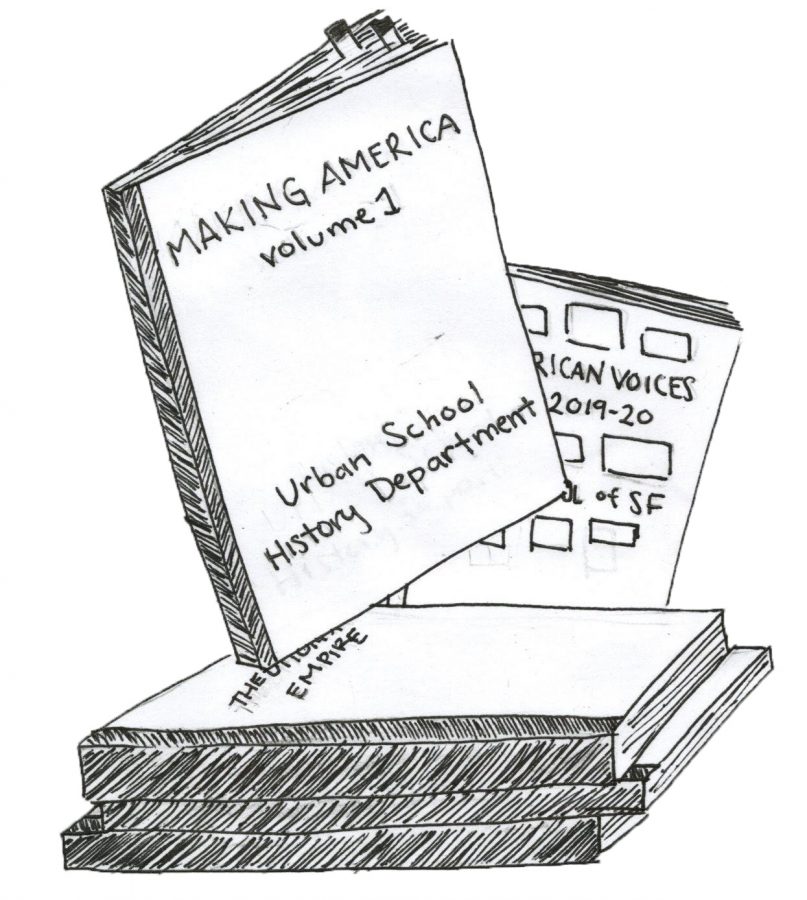Rethinking the Reader
With forty years of history, Readers have become a staple in the Urban Curriculum. Teachers are continuously adapting Readers to fulfill students’ needs, but is it time for Readers to take another step forward? With the rising awareness of climate change and global warming, should Urban consider digital Readers?
Rebecca Shapiro, Chair of the History Department, said that Readers were initially created to solve the issue of asking students to buy several books. The requirement of buying multiple books can not only lead to the production of “even more waste,” she said, “ [but can also cause] a real financial strain.”
The elimination of several larger texts allows each department to include several shorter works. Ellie Howell, ‘22, is appreciative of printed Readers because of their convenience and the fact that “everything is right there,” she said.
Shapiro said the History Department bases the construction of their Readers on key concepts “and the understandings [they] want students to build.” Additionally, a reader’s content is affected by “how many days [teachers] have and what type of assessment [teachers] want students to do,” she said. Once all these points are addressed, the faculty has to begin cutting down and finalizing what’s included.
The construction of Readers is not always straightforward and takes time and consideration. Courtney Rein, Chair of the English Department, said that because Readers are a compilation of existing documents it’s an opportunity to include “lots and lots of sources.”
Aside from the fact that Readers contain the majority of texts covered in class, the fact that they are printed has its own academic advantages. Sophia Stephens ‘20, a member of Green Team, stated Readers work well for her style of learning because she “can flip through the pages and highlight things.”
Similar to Stephens, Rein said that because her “own skills of attention are pretty limited, reading in hard copy form helps [her] be really present, connected and engaged,” with a text.
The physical copy of Readers allows students to annotate and formulate their own ideas presented in a text. When talking about the difference in reading comprehension between online and printed texts, Maria Gilje Torheim, writer for the Phys, a publication that focuses on science-related news, said that “the length of the text seems to be the most critical factor. If the text is long, needs to be read carefully, and perhaps involves making notes, then studies show that many people…still often prefer a printed book.”
In an article published for the Scientific American, Ferris Jabr, a writer and journalist based in New York, highlights the process in which we perceive the physical world. Jabor then considers “treating individual letters as physical objects.” Jabor writes, “when we read, we construct a mental representation of the text in which meaning is anchored to structure,” like how we perceive our surroundings.
However, despite personal preferences and scientific research, the unfavorable effects that paper has on global warming are indisputable. “These Readers are one and done,” Rein said.
Tree logging not only contributes to deforestation but also eliminates one of the only natural protectors against climate change. Plants act as sponges, with their unique ability to absorb and store surrounding greenhouse gases like carbon dioxide. Greenhouse gases can redirect heat back to Earth, which the United States Environmental Protection Agency has said to be causing global warming. One of the many consequences of cutting down trees is the release of harmful greenhouse gases back into the atmosphere.
With the increasing frequency of natural disasters leading to deforestation, global warming, and protests addressing climate change, the awareness of one’s carbon footprint and paper consumption has been increasing as well. As technology improves, students can engage with online tools more and more. These tools will let students learn in different ways. For example students can both listen along to a text while simultaneously reading them. Additionally they may be able to write clear, more legible notes in the margin as reminders. With these benefits to consider, teachers face the question of whether introducing a digital reader would be a solution to paper waste while maintaining Urban’s academic rigor.
Being a heavily discussion-based school, at Urban, Shapiro has noticed having a laptop open makes it harder to tell whether a student is truly engaged. Additionally, she has observed, “that students tend to annotate and remember text better on the page than when they read it digitally, and [this] supports better exchange and discourse.”
Computers’ abilities to access practically anything may be both a student’s best friend and enemy. From Schoology and Google Docs to Netflix and Spotify, Rein wonders whether the problem is not really whether Readers should be printed or online, but whether the Urban community needs a different approach. She offered the idea that Urban “needs to…teach better relationships, healthy relationships to our technology… to govern ourselves.”
Both the History Department and the English Department have begun discussing ways to create a more effective and eco-friendly reader. Shapiro said the History Department has room for improvement that may just start with “being pretty honest with [themselves] about what [they] haven’t had students read in a few years and tak[ing] those out.”
Rein is excited to bring the question of how can teacher construct Readers more effectively and discuss with the English Department what “small things [they] want to try out and experiment with.” While teachers have control over what is included in Readers, students have the opportunity to dispose of Readers in the recycling at the end of a term. This simple act of environmental consciousness can influence others and encourage positive change.
As Stephens said, consciousness and mentality are what prevent change, “everything that individuals do [has] an impact on a larger scale. There is always something you can do, like advocate for change.”


